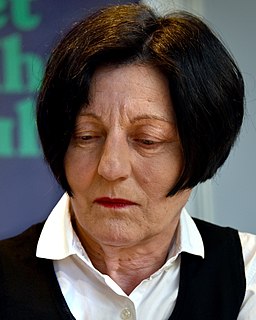Top 49 Quotes & Sayings by Herta Muller
Explore popular quotes and sayings by a German novelist Herta Muller.
Last updated on April 20, 2025.
For me, each journey to Romania is also a journey into another time, in which I never knew which events in my life were coincidence and which were staged. This is why I have, in every public statement I have made, demanded access to the secret files kept on me which, under various pretexts, have invariably been denied me.
My first book, 'Nadirs,' was very important for me. I'll leave its literary worth for others to judge. But its publication in Berlin in 1984 gave me protection. As did the awards it won. The Romanian secret police could no longer treat me and my friends as though we were completely cut off from the rest of the world. And we no longer felt cut off.
My flesh was burning where the skin was scraped off my knees, and I was afraid that I couldn't be alive anymore with so much pain, and at the same time I knew I was alive because it hurt. I was afraid that death would find its way into me through this open knee and I quickly covered my knee with my hands.
What can be said about chronic hunger. Perhaps that there's a hunger that can make you sick with hunger. That it comes in addition to the hunger you already feel. That there is a hunger which is always new, which grows insatiably, which pounces on the never-ending old hunger that already took such effort to tame. How can you face the world if all you can say about yourself is that you're hungry.
Some people speak and sing and walk and sit and sleep and silence their homesickness, for a long time, and to no avail. Some say that over time homesickness loses its specific content, that it starts to smolder and only then becomes all-consuming, because it’s no longer focused on a concrete home. I am one of the people who say that.
I'm always telling myself I don't have many feelings. Even when something does affect me I'm only moderately moved. I almost never cry. It's not that I'm stronger than the ones with teary eyes, I'm weaker. They have courage. When all you are is skin and bones, feelings are a brave thing. I'm more of a coward. The difference is minimal though, I just use my strength not to cry. When I do allow myself a feeling, I take the part that hurts and bandage it up with a story that doesn't cry, that doesn't dwell on homesickness.























